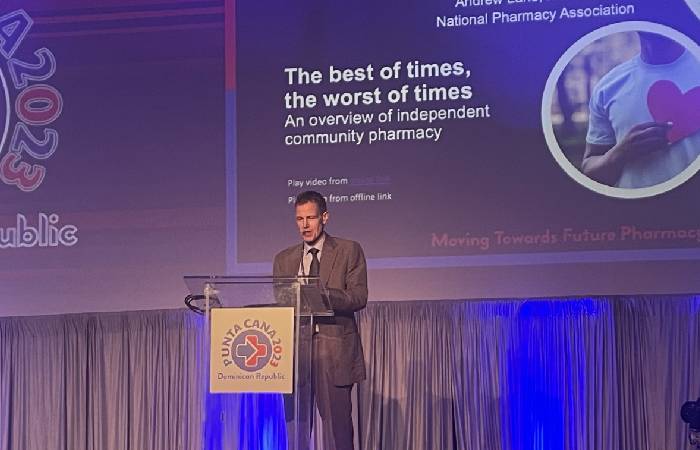Time to think big and transform the contract, says Lane
In Profession
Follow this topic
Bookmark
Record learning outcomes
NPA chair Andrew Lane has again called for a complete transformation of the contractual framework in England.
Speaking at this week’s Sigma conference, he said the contract is not working for NPA members, the wider sector or the NHS and Government with spiralling drug costs and doctors out on strike. “You’ve only got to see what’s happening to the Lloyds pharmacy business to realise it’s a sector-wide problem,” he said.
The basic idea that pharmacies would be viable by taking on new services is not supported by the contract structure or its associated funding. “A fundamental rethink is needed if the sector is to recover, thrive and deliver for patients. We can’t wait until the end of the current framework in 2024 before giving serious thought to what should replace it,” Mr Lane said.
Pharmacies in England are being “choked” by the contactual framework. “It is unfit for purpose after years of underfunding and works against contractors who can’t purchase [medicines] at scale.”
Mr Lane highlighted the conflicted situation the sector finds itself in. “On the one hand pharmacy is supported as much as it has ever been in terms of public and political sentiment and promises by the great and good. On the other hand we are under more pressure than ever with no end to our difficulties on the near horizon, seemingly with PSNC talks stalling on any new money.”
Principles for a new deal
The NPA will shortly be publishing a list of principles that should underpin a new deal for community pharmacy, he continued. For example:
1. Empower contractors. The contract must allow contractors to be masters of their own destiny to a far greater extent than now. “Current arrangements put pharmacy owners at the mercy of circumstances beyond their control, be it wholesale price rises or the reluctance of some GPs to refer into services like the CPCS,” he said.
2. Build services on supply. This is absolutely fundamental, he said. The NPA’s vision is for a clinical service-based future with pharmacy as the front door to the NHS. However, this cannot mean abandoning the medicines supply function, which pharmacies have performed with resilience for so long, clearly demonstrated during the pandemic, he said. “A mixed service and supply model could deliver a structural change that both improves our clinical offering and puts us into a much stronger financial position.”
3. Pay pharmacies in a timely fashion that incentivises investment. The current system of excess margin and clawbacks is a barrier to investment and forward planning. They undermine confidence to modernise and implement new clinical services in the future. “If the future vision is not clear, nobody will invest in it,” commented Mr Lane.
4. Rebalancing power. As one one-sided contract negotiation follows another, the argument for some kind of independent arbitration becomes ever stronger, argued Mr Lane. It would mitigate the risks of a monopsonistic purchaser using its power to achieve short-term gain at the cost of sustainability. The imbalance of power between the parties to contractual negotiations serves no-one in the long term, he believed.
Time to think big
Mr Lane felt that NPA members, by their nature as natural innovators and skilled healthcare professionals, are particularly open to the idea of an ambitious, transformative change. “It is time to cast off the shackles of the existing contractual framework, think differently and think big,” he said.
Some things can happen sooner and faster and don’t require wholesale change for a relatively quick win, he continued. “We ask NHS England once again to restore some of the clinical capacity sucked out of community pharmacies in recent times by the Additional Roles Reimbursement Scheme.
"How can it make sense that NHS investment in GP and PCN pharmacists has increased whilst investment in community pharmacy – a vital, patient-facing clinical asset – has gone into reverse? So please NHS England, let’s think seriously about re-directing funding to patient-facing, independent prescribing services in community pharmacies.”
As a sector, there are many weighty matters to navigate together, including the future direction of the profession, the way community pharmacies are represented, contract reform and how to restore the sector’s battered finances.
“Not everyone will agree on the way forward. So let us all prepare to seek common ground and discuss our mutual concerns robustly yet respectfully and constructively,” he concluded.

